This post is part of series by Brookings experts on Trump in 2018.
Newly-elected Alabama senator Doug Jones won as a result of the high turnout among African American voters, especially black women. Despite Alabama’s largely white population, the upset of controversial Republican candidate Roy Moore reflected the collective mobilization and response of African Americans to the vitriolic and often racist politics spewed during this period of Trumpism.
The actions of black voters not only demonstrated the strength of their voting bloc, but also their critical importance to the Democratic Party that should concern Republicans leading up to the next midterm and presidential elections.
African Americans, however, were not alone in Alabama. Described by the Guardian as a “perfect storm,” African American and millennial voters forcefully disrupted both Moore’s congressional aspirations and a repeatedly-successful Republican strategy to build and maintain an electoral coalition. Exit polls reported that Jones won millennial voters (aged 18 to 29) by 60 percent to 38 percent, which helped deliver his victory.
While the formula for Alabama’s Democratic victory could potentially generate similar outcomes in other national and local elections, it also puts pressure on some Republicans to ramp up their voter suppression efforts in 2018. In Alabama, the Republican state Attorney General has already started an investigation into voter fraud after Jones’ election, despite clear displays of voter suppression during the last election—an issue the A.G. has opted not to investigate. Between the Secretary of State sending non-forwardable voter registration cards to the homes of black and poor residents, and police officers checking IDs as voters entered their polling location, efforts to keep blacks away from the polls were rampant in Alabama.
The stakes have now been raised
Earlier this year, Trump established the Elections Integrity Commission, whose charge is to search for and weed out cases of voter fraud. Vice-chaired by the controversial Kansas Secretary of State Kris Kobach, the commission has already faced some challenges. Most recently, two commission members called out Kobach, who has been known to suppress the vote in his own state, for his lack of transparency among members.
The commission’s most recent hearing in New Hampshire came days after receiving allegations of voter fraud during the 2016 elections, primarily attributed to same-day voter registrations of residents with out-of-state driver’s licenses. Before this, New Hampshire legislators were pushing for the creation of more stringent voter ID requirements for residents, and pushing for the arrest or incarceration of individuals who are improperly or fraudulently registered. State Republicans are also in the process of drafting legislation that disenfranchises its college students by imposing fees, or a new poll tax, on those who reside out of state and want to register. Today, all driver’s licenses are acceptable forms of ID, but if you don’t drive or plan to live permanently in New Hampshire, you’re probably not going to vote in the coming months.
Restricting voter access for college students is not new. However, when coupled with the historical disenfranchisement of people of color, the impact and consequence of these systematic changes and constant microaggressions can have detrimental effects on the activation and mobilization of these groups.
Given that age-old intimidation tactics did not successfully throw the Alabama election this year, next year will most likely usher in more unchallenged federal attacks on the Voting Rights Act, especially under the leadership of U.S. Attorney General Sessions—whose former seat was the one at issue. And already-disenfranchised citizens will continue to be subjected to unreasonable voter ID requirements and possibly outright violence when exercising their right to vote.
I recently heard someone interviewed after Doug Jones’ victory say, “Alabama bled blue for the first time in 25 years.” But this victory for the Democrats should also put voting rights advocates and activists on alert because the stakes of future elections are raised even higher for the GOP.
Considering the leadership and assignment of the president’s commission, voter protection must be one of the most pressing policy and civil rights priorities in 2018 and beyond.
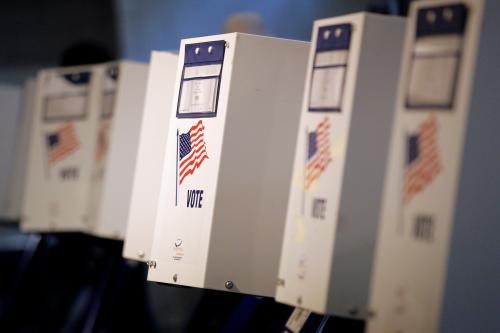
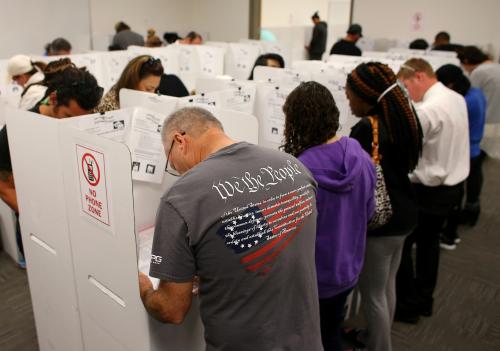
![For USA-ELECTION/VOTING-NORTHCAROLINA [moving at 0600 EDT (1000 GMT) Friday, July 15, 2016]A pile of government pamphlets explaining North Carolina's controversial "Voter ID" law sits on table at a polling station as the law goes into effect for the state's presidential primary in Charlotte, North Carolina, U.S. on March 15, 2016. REUTERS/Chris Keane/File Photo - RTSI0CT](https://www.brookings.edu/wp-content/uploads/2017/01/gs_20170123_nc-voter-id.jpg?quality=75&w=500)
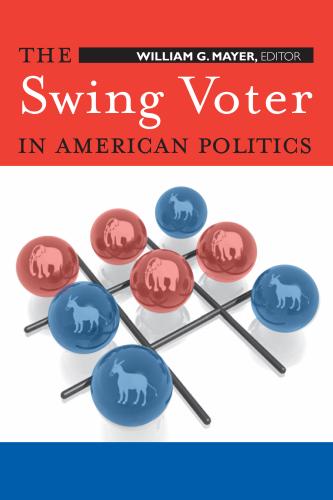

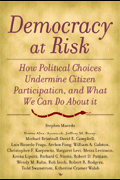

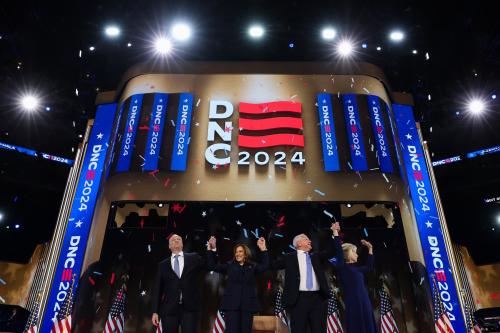
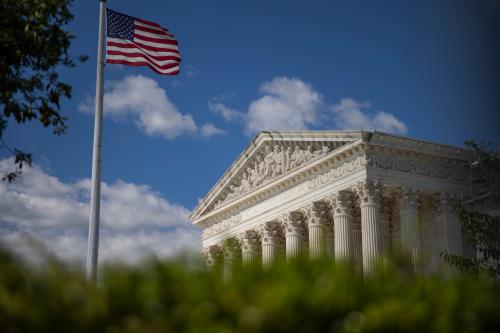
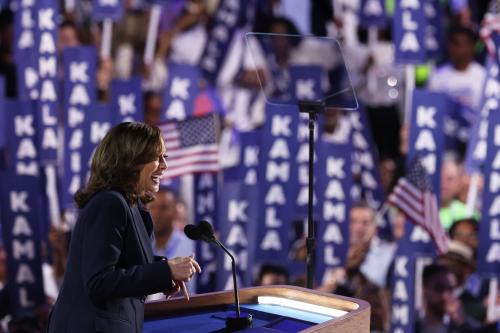
Commentary
Trump in 2018: Could a Democratic victory in Alabama open the doors to increased voter suppression?
December 27, 2017